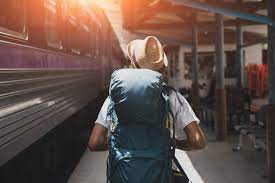Explaining Ultimate Guide to European Backpacking
Introduction:

European backpacking is a timeless adventure that has captivated the hearts of wanderers for decades. The continent offers a rich tapestry of cultures, history, and landscapes, making it an ideal destination for those seeking diverse experiences on a budget. In this ultimate guide to European backpacking, we will delve into the essentials, from planning your itinerary and navigating transportation to embracing the local culture and making the most of your budget.
1. **Planning Your Itinerary: Crafting the Perfect Route**
Before embarking on your European backpacking journey, it’s crucial to plan your itinerary thoughtfully. Europe is a vast continent, and each country has its unique charm. Consider your interests, preferred travel pace, and the duration of your trip. Research various destinations, taking into account historical sites, natural wonders, and vibrant cities. Once you’ve identified your must-visit locations, create a flexible itinerary that allows for spontaneity while ensuring you cover your chosen highlights.
2. **Transportation: Navigating Europe on a Budget**
One of the perks of backpacking in Europe is the efficient and extensive transportation network. From trains to buses and budget airlines, there are numerous options for getting around. Consider purchasing a Eurail pass for seamless train travel between countries or opt for regional buses to explore off-the-beaten-path destinations. Budget airlines can be cost-effective for long distances, but be mindful of baggage fees and additional charges. Embrace the local transportation modes, such as trams and metros, for a more immersive experience.
3. **Accommodation: Hostels, Budget Hotels, and Beyond**
Accommodation options for backpackers in Europe are diverse, catering to various preferences and budgets. Hostels are a staple for budget-conscious travelers, providing not only affordable beds but also opportunities to meet fellow adventurers. Booking platforms offer a range of budget hotels, guesthouses, and even Airbnb options. Consider staying in unique accommodations like monasteries or rural cottages for a memorable twist. To save money, be flexible with your booking dates and take advantage of discounts during the off-peak season.
4. **Packing Essentials: Traveling Light and Smart**

Packing is an art when it comes to European backpacking. Traveling light is key, so focus on versatile clothing, comfortable shoes, and essential toiletries. Invest in a quality backpack that distributes weight evenly and meets airline carry-on size requirements. Pack a universal power adapter, a first aid kit, and a compact travel towel. Don’t forget important documents like your passport, travel insurance, and any required visas. Embrace the mantra of “less is more” to ensure mobility and flexibility throughout your journey.
5. **Cultural Immersion: Embracing Local Traditions**
One of the joys of European backpacking is the opportunity to immerse yourself in diverse cultures. Engage with locals, try regional cuisine, and participate in traditional festivities. Learn a few basic phrases in the local language, as this small effort can go a long way in fostering connections. Visit local markets, attend cultural events, and stay in neighborhoods that reflect the authentic spirit of the destination. Open yourself up to new experiences, whether it’s joining a local dance, tasting exotic foods, or learning about regional customs.
6. **Budgeting Wisely: Maximizing Your Resources**
European backpacking can be surprisingly affordable with careful budgeting. Create a daily budget that includes accommodation, meals, transportation, and activities. Take advantage of free walking tours offered in many cities to familiarize yourself with the local history and landmarks. Opt for budget-friendly meals by exploring local markets and avoiding tourist hotspots. Save on transportation costs by walking or cycling when possible. Consider a travel money card to minimize currency exchange fees, and keep track of your expenses using budgeting apps to stay within your financial limits.
7. **Safety and Health: Prioritizing Well-being on the Road**
While European cities are generally safe for travelers, it’s essential to prioritize your well-being. Keep copies of important documents, such as your passport and travel insurance, and store them separately from the originals. Be cautious of pickpockets in crowded areas and use a money belt for added security. Stay informed about local health guidelines and vaccinations, and carry a basic first aid kit. Purchase travel insurance that covers medical emergencies and unexpected travel disruptions to ensure peace of mind throughout your journey.
8. **Navigating Language Barriers: Tips for Effective Communication**
While English is widely spoken in many European countries, it’s beneficial to learn a few basic phrases in the local language. This effort not only shows respect for the culture but also helps bridge communication gaps. Utilize translation apps for on-the-spot assistance, and don’t be afraid to use hand gestures and body language to convey your message. Embrace the challenge of navigating language barriers as part of the enriching experience of backpacking in diverse environments.
9. **Solo Travel: Independence and Empowerment**
European backpacking is an excellent opportunity for solo travelers to embrace independence and empowerment. Plan your itinerary with flexibility, allowing room for spontaneous adventures and new connections. Stay in hostels to meet like-minded travelers and consider joining group tours or activities to share experiences with others. Trust your instincts, stay aware of your surroundings, and enjoy the freedom that comes with navigating Europe on your terms.
10. **Environmental Responsibility: Leave No Trace**
As an increasing number of travelers explore Europe, it’s crucial to prioritize environmental responsibility. Embrace sustainable travel practices by minimizing your ecological footprint. Use reusable water bottles, bags, and utensils to reduce single-use plastic waste. Opt for eco-friendly accommodations and transportation options when possible. Respect local ecosystems and follow the principles of “Leave No Trace” by disposing of waste responsibly. Contribute to the preservation of Europe’s natural beauty for future generations of backpackers to enjoy.
Conclusion:
European backpacking is a transformative journey that offers a blend of adventure, culture, and self-discovery. By planning thoughtfully, embracing cultural immersion, and budgeting wisely, you can make the most of your backpacking experience. Whether you’re exploring iconic cities, meandering through picturesque villages, or trekking in nature reserves, Europe invites backpackers to discover the richness of its diverse landscapes and people. So, grab your backpack, embark on this unforgettable adventure, and create lasting memories as you navigate the enchanting tapestry of Europe.






